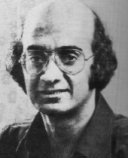 Tony
Myatt
Tony
Myatt
Smooth talking Tony Myatt is Capital Radio’s late night man. Starting
out on Rediffusion, he hosted a variety of programmes before spending
some four years in Hong Kong. There he not only worked for commercial
radio, but also as a reporter and feature writer. Back in Britain
again, Tony found himself presenting a weekly show on Radio Two Nightflight
from midnight till 2 am. But daytime listeners may have heard him
without even realising. For Tony’s voice was heard in nearly every show
as he announced forthcoming programmes in his trailers. But it wasn’t
until he started with Capital, that he was to get his own afternoon
show and the name ‘Topless Tone’! A spell of jaundice took Tony off the
airwaves for many months, and when he returned he took over odd shows
whilst he recuperated
 Roger
Scott
Roger
Scott
32 year old (in 1976) Roger Scott’s first interest in radio was whilst
he was a merchant seaman. Sculling around the world there was little
else to do than listen to the radio. Back in Britain in 1966, Roger
read about the Local Radio Association in one of the Sunday papers. He
was so interested in becoming involved in commercial radio in Britain,
that he went off to America to learn the trade. He went from WPTR in
Albany to a station in Montreal, to Halifax and then back to the
Montreal station as a programme director. In 1970, when the
Conservatives came into power and pledged commercial radio, Roger
returned to Britain, but a little prematurely. Firstly he worked for
Associated Newspapers who had plans for a station and then for the
United biscuits Network. In between times he ran a production company
making syndicated radio programmes for America and Australia.
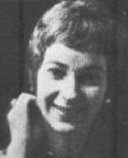 Joan
Shenton
Joan
Shenton
An Oxford graduate with a BA (Honours) degree in modern languages, Joan
has written and broadcast in Spanish for the BBC’s Latin American
Service. After four very successful years as an interviewer, reporter
and presenter with the BBC’s Nationwide, Joan went on to become a
regular interviewer with Thames TV. Still with Thames on a small scale,
she has spent the last three years with Capital Radio first on a
morning shown with Tommy Vance and now on Person to Person,
a hospital request programme.
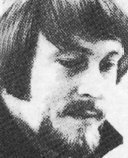 David
Symonds
David
Symonds
Born in Oxford and educated in Berkhamstead, Hertfordshire, Dave read
Botany at Oxford for a year. Shortly after leaving university, he
headed for New Zealand. Spending a while as a lumberjack, he applied
and got a job at the New Zealand Broadcasting Corporation. Returning to
Britain in 1965, Dave joined the BBC as an announcer. Before long, he
was presenting Playtime, Newly Pressed and Breakfast Special, but his
jump to fame was with Easybeat. In 1967, he went
freelance and worked for both Radio One and Luxembourg. Before joining
Capital Radio in 1973, Dave worked as the commercial production manager
for Luxembourg and as a record producer. After a period of time with
Portsmouth’s Radio Victory he left to pursue his career in another
direction.
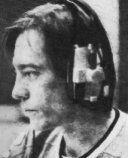 Tommy
Vance
Tommy
Vance
Possibly one of the most experienced yet unappreciated DJ’s is 31 year
old (in 1976) Tommy Vance. Starting out in Life as a merchant seaman,
Tommy went on to be a disc jockey in Canada and America. He worked for
many stations there before returning to these shores in 1966. Then he
worked for Radios Caroline; Luxembourg and London. When Radio One
opened up he co-hosted Top Gear with John Peel before going on to
present a number of highly successful shows for the network. What’s
New, TV on Radio, and Radio One Club, to name a few. After leaving
Radio One and up until joining Capital in 1973, he worked in BBC World
Service, BFBS, and was first presenter of Disco 2,
BBC 2’s first rock programme. He also spent some time with the short
lived International Service of Radio Monte Carlo. On joining Capital he
presented a number of daily shows before finally taking over a four
hour show on Saturdays.
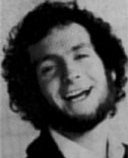 Kenny
Everett
Kenny
Everett
Born as Maurice Cole on Christmas Day 1944. This Liverpudlian was soon
entertaining the teachers at St. Edwards Primary. After a long bout of
educational fever, Ken touched down to south Africa to help out at St.
Peter Calvier School for budding Missionaries, but alas they didn’t
like his help and he returned to Liverpool. On the suggestion of a
humorous friend, one Alan Edward Beeby, Kenny decided to launch some
zany tapes in the direction of Broadcasting House. After showing very
little interest, Auntie Beeb finally invited this nut down to be
interviewed on the Home Service. Well the BBC wasn’t really ready for
all of this, so they suggested (under the table of course) that big Ken
approach the pirate stations; doing so, ‘Big L’ pulled the lad in.
Radio London listeners were heartbroken when Kenny moved onto land
permanently to join the BBC in May 1967. Ken joined the Radio One team
in October 1967, presenting Midday Spin and Where It’s At with Chris
Denning. From January to June 1968 he presented two hours of madness on
Sunday called The Kenny Everett Show. In July he
finally got a daily show. 1970 found Kenny on his way out of Radio One
in a hurry, he got sacked for something he said. For the next three
years he worked for various radio and television stations in Britain
and Europe, before getting a starting berth on Capital Radio in London.
For the first year and a bit, Kenny worked with his old buddy Dave Cash
in the morning, then by himself and after a nervous breakdown, he
retired to doing commercials and two weekend shows.
From the book
"The Music Spinners, Britain's Radio DJs", edited by Nick Oakley
& Dave Gotz, © 1976 MRP Books.
Click here for more info on Kenny
Everett and details on how he made his jingles.
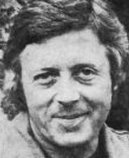 Michael Aspel
Michael Aspel
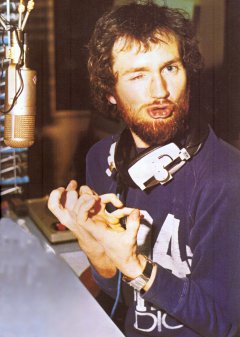
 Tony
Myatt
Tony
Myatt  Roger
Scott
Roger
Scott  Joan
Shenton
Joan
Shenton 
 Tommy
Vance
Tommy
Vance 